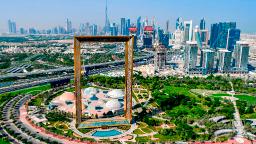It’s a significant change for residents and visitors, although it is still illegal to drink in public places, such as parks, beaches, or malls. And being drunk and disorderly or driving under the influence could result in a fine or a spot in jail.
“Dubai became a global tourism magnet while the tax was applied, as it has so much to offer to tourists that the alcohol pricing was never an impediment,” explains Magdalena Karolak, associate professor of Humanities and Social Sciences at a university in the United Arab Emirates.
According to Karolak, the new rules are in line with other social changes implemented in recent years. These include the shift to a Saturday-Sunday weekend, which was previously on Friday and Saturday, food outlets being permitted to continue service during the daytime throughout the holy month of Ramadan, with significantly reduced restrictions, and the creation of a new family law for non-Muslim expat residents. The family law comes into effect in February and allows expats to deal with personal…
Click Here to Read the Full Original Article at CNN.com – RSS Channel – Travel…
